Trending
Opinion: How will Project 2025 impact game developers?
The Heritage Foundation's manifesto for the possible next administration could do great harm to many, including large portions of the game development community.

Featured Blog | This community-written post highlights the best of what the game industry has to offer. Read more like it on the Game Developer Blogs or learn how to Submit Your Own Blog Post
My name is Meredith. I’m the Producer at Ultimerse, a virtual reality company in Melbourne, Australia. We just exhibited at PAX AUS for the very first time, and there are a million things I wish I’d known - here are just a few of them.

My name is Meredith. I’m the Producer at Ultimerse, a virtual reality company in Melbourne, Australia. We just exhibited at PAX AUS for the very first time, and there are a million things I wish I’d known - hopefully this will help you next time you need to plan for a con.
Yes, this is absolutely giant. You might only need one section, so feel free to skip around. I really struggled to find information pre-PAX, so I wanted to collate as much as I could. If you have absolutely no idea what you’re doing (like I did) this could be a good starting point.
This is my general advice - if you have specific questions, PLEASE get in touch at @merryh on Twitter - I’d love to help.

BEFORE:
Get As Much Information As You Can From The Coordinator
Exhibitors are busy. Those running the exhibition are busier. Make sure you get together with your team and put together a big list of questions that cover absolutely anything you might need to know, and continue to do so throughout the planning process. The last thing you want to be doing a week before is trying to get in touch with someone who has four thousand emails in their inbox.
You might feel bad sending a bunch of questions, but don’t! This is your booth and your baby and a lot of money is going into it - your account manager will understand, and it’ll benefit you both in the long run when you know you already have your answers. Try and find out your location early on - we were lucky enough to be directly inside Door 4, so we could coordinate our external booth decor to hit high traffic areas with the best images.

If you’re co-ordinating the booth for your team, remember that you need to communicate pertinent information to them. I used a booth bible which ended up being about 52 pages long, but contained everything important so they could read it before the event and flick through (I've included a blank template version for you at the end of this.) Filter through what they don’t need to know, but don’t leave them in the dark. You’ll be busy on the day as well, so don’t put them in a position where they have to find you every time something goes wrong. I should have gone through more training on Square, done some demos on how to use it, and explained where everything was being stored ON THE DAY. That’s on me, not them - they can’t be expected to just know things that have only been communicated to me or organized by me.
Pick The Space That’s Right For You
You don’t always need the biggest booth to make the biggest impact. Remember, people mostly know what the AAA’s are about. They’re usually here to find what they haven’t heard about, so you don’t need to have wacky-waving-inflatable-arm-flailing-tube-men to get their attention (unless you’re Inflatality and sticking super on brand, anyway).
Make sure you have a consistent aesthetic in the space across your artwork, merchandise, and decor so you’re recognisable, but don’t worry about going for more than you need. All you’ll end up doing is struggling to fill the space, potentially making it look cluttered, or boxing yourself in when you don’t need to. People like to see people playing games, so an open space can be a good thing!

Think about how long people might linger at your space and the sort of vibe you want to create. If you have a game that’s heavily narrative focused and quite sombre, you might want a small space that’s slightly enclosed so people have more space to be vulnerable. If you have a really fun co-op or competitive game, you probably want room for spectators and to be open and visible. Ask yourself about the booth you’d want to approach, and try and think about the peripherals that will encourage that more than the space. Stick to your budget. You’ll have a lot more expenses than just the booth, so don’t be tempted to go big for the sake of it.
Set A Budget - And Some Goals.
We are very lucky that our investors and backers are willing to put their money where their mouth is and invest in expos like PAX, but if you’re a smaller studio, this is going to be a huge toll on your finances - not to mention if you need to travel domestically or internationally.
This doesn’t mean it won’t pay off, but it means you need to be mindful of how much you want to spend and where. Is your goal to sell merch? Perfect, that’s where you put your money - the purchase, selling and display of your merchandise alongside your game. Do you just want eyes on your game? Then you need to invest in the decor and feeling of your booth.
Try and portion out your finances against these goals, then add an extra grand at least for the myriad of things that you won’t have considered - urgent purchases during the event, food and drink during the event, lollies for playtesters, the list goes on.
We did not set super clear budgets or super clear goals and it was frankly, our biggest mistake. We had a general idea of what we wanted to spend and what we wanted to achieve, but I wish we’d taken the time to write it all down as SMART goals.
How Long Is Your Demo?
Depending on what you’re demoing, you probably need to allocate at least one to ten minutes to speak to the person about it before or afterwards. If it’s just you and one other person manning your booth, you’re going to be hardpressed to do this if your demo is only five minutes long, so you’re probably better giving people more (or unlimited) time to play and get an understanding of the game. You then have to ask how this will impact on people waiting to play. Are you comfortable kicking people off? If not, you probably want at least two stations. Do people know about your game? Double how busy you think you’ll be. Ask yourself how many stations you’ll have - can one person play? Two? Is it co-op? If so, will you have the space to have more than one demo station for people to crowd around?

For us, we knew we were going to have a lot of people to get through. VR is notoriously popular at expos, both for the novelty factor and because it’s a newer medium. It also takes about two to three minutes to get each person in a headset, comfortable, explain the controls if they don’t know them, and make sure they’re facing the right way. We decided to settle on a five minute demo, giving individuals time to either beat the boss or run out of time. These felt like the most satisfying conclusions to us, while still letting people feel like they had a chance. We had a line for all three days, but I don’t think anyone waited more than 20 minutes to play, thanks to the fact that we had two stations, both running at between 7-10 minutes to get one person through. We also knew that we wanted the demo to be family friendly, even if the full game is going to be slightly cruder as we know kids love VR.
Balance the wait against the experience and just ask yourself - how long would you be happy to wait for what you’re showcasing? 5 minutes? 10? 20? Find the cut-off and balance accordingly.
Merchandise! Selling & Displaying:
Think about what you can afford to sell, what people will want to buy, and what you’re allowed to sell. Do people already know about your game? Do they know about a previous game? If so, they’re much more likely to invest in your merchandise if they have connected with your game or brand. Things that almost always do well are high quality pins and plushies. Things that are more high risk/high reward could be tees (if you’re a new studio), soundtracks, or more outside the box merchandise.
For example, Samurai Punk sold Skateboards at PAX AUS and they looked freaking awesome. This is an example of merch that is interesting to people even if they aren’t looking to buy it - think about your conversion rate when you’re taking these risks. If someone comes to your booth because the merch is cute and asks about the game and ends up buying it, this can be worth more than what the merch sale would have been.
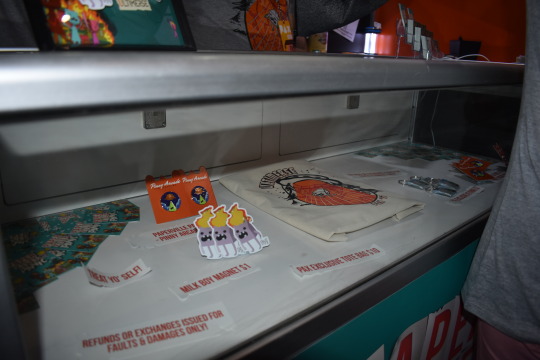
Try and have at least one thing you can give away for free to playtesters - badges (or stickers, if your expo allows it - most don’t) are perfect for this.
Anything you want to sell you need to order at least four to six weeks early. Remember, depending on the time of year, some merchandising places will be hit harder than others and you may be looking at even longer times. Make a conscious list of merchandise, what it’s purpose is, what you’ll price it for, what the potential return might be and sit down with your leaders to discuss what they’re happy to invest in and what they’re not. Everything should have a purpose.
Look At Surrounding Events:
You might think you’re prepared for your event, or in our case PAX. I can guarantee you’re already forgetting that it’s not just your event that’s on - you’re not just preparing to survive one or three days, but a week or more.
Almost every large scale games event means a few things - one, that a lot of people who aren’t normally in town, are - two, there is likely at least one related event on that week, if not more.
Networking (a kind of gross term, but there isn’t really a better word for it) is so important, so you need to be at those events saying hi. This means an extra potentially three days where you’ll be meeting people, and talking. You have to eat, so you’ll probably get dinner and drinks with them, and knowing how great the community is you might talk till four in the morning.
Don’t gear up for one, or two, or four days of busy-ness, sleep deprivation, and hard work. Gear up for a week at least - not to mention the week or months you’ll spend preparing, or days of travel. You will have GCAP, or GDC, or parties - something that will mean you’re worn out. However prepared you think you need to be, triple it.
Drink all the water in the world, have at least one night to rest, fully accept that you will probably lose your voice even before you get to the main event. If you’re a solo dev - how will you deal with that if you can’t communicate about your game to the crowd? Your hard work deserves to be seen, so don’t let it go to waste. On that note...
Find Help!
If you are a solo dev or a small team, get in touch far in advance to ask for volunteers. If you can supply someone an exhibitor pass, they’ll often be super happy to help out at your booth for a day. This lets you take a break, see the show (or at least part of it), can save on travel expenses if it’s international and often gives an opportunity to students or aspiring devs to make some really cool connections.
You can ask on Twitter or Facebook for recommendations, contact people directly, or contact local universities. This is usually the best way to make sure you’re getting someone vetted, who cares about the industry and ideally, the success of your game.
This also doesn’t just apply to who is manning your booth. Speak to some of the companies attending and see if they’ll sponsor some peripherals for you. We were lucky enough to have MWave provide us custom PC builds, with all our programs pre-loaded, gorgeous keyboards mice and mousepads. This was the biggest lifesaver, gave us the chance to form a great relationship and saved us from lugging our personal machines around. More on that later!
Speak To The Exhibitor About Opportunities:
For PAXAUS, we sold Pinny Arcade Pins - they’re a notable collectable, look great, and have a decent return for investment. More so than this, they lend credibility to your brand, encourage people to visit your booth that otherwise wouldn’t, and allowed us to be present on a bunch of marketing material. Most big expos will have opportunities like this, so if you can only afford one merch item, make it one like this that gives you a big return on visibility and encourages purchasing.

(Sidenote: We also sponsored GCAP because we firmly believe in the power of education in the community, but also because it’s just a smart thing to do - it puts your brand in the spotlight for a moment, and you get to know you’re helping your wider community succeed. Win win!)
Look Into Funding:
You’d be surprised how many people are willing to help - Film Victoria has a grant that is specifically for PAX Aus. Don’t be fooled by the name - they support all kinds of screens. I can almost guarantee there is some funding available from someone, somewhere - but it can be hard to know where to start!
Speak to people who attended the event the year before, or even the event managers. They might be able to put you in touch with someone who can provide some funding. It may not be a million dollars (remember, they have limited funding to draw from and it needs to support a number of businesses!) but it makes a big difference in the long run, and allows you to foster a really awesome connection that can be useful long term that even if you don’t get funding this time round, could mean you’re in with a better shot next time for different funding.
We were lucky enough to receive a PAX Rising Grant from Film Victoria and all we had to do was display some Creative VIC/Games Week graphic elements that genuinely looked super cool. It was so satisfying to look out at the floor at bright pink everywhere showing how much support the community had from the state government.
Select Your Booth & Floor Plan:
So you picked a booth - nice! Let’s say it’s 3m by 3m. How are you going to fill it? We were initially hoping to tape out the size but it really doesn’t give you a lot visually to play around with.
The easiest way to do this is to use a floor planning website. I know, not exactly their intended purpose. I used a website called https://planner.roomsketcher.com/.
This is especially useful if you’re hiring furniture, because you can actually set it to it’s size and space out your internals. If you’ve got a small space, you probably don’t need to worry about this so much. Here’s some WIP’s of our booth, from initial plan to scale through to final designs.


This was SO useful. Not only because I could see exactly where furniture would fit, how much storage we would have, how much space - but especially because we were VR, it allowed us to map out exactly how many stations we could have. It almost meant I could then make 3D mock ups of what the booth was going to look like, which helped us plan our decor and designs. We made a few on the day changes, but it was quick and easy thanks to having a general idea of what we wanted the booth to look like.

Hire or Buy?
It is almost always better to buy than hire when it comes to technology for these events. It’s cheaper, you can use it for future events, you don’t have to worry about damages/forms/freight and a bunch of emails and confirmations and not having any idea how it will actually look.
However, if you’re travelling or are otherwise busy/stressed, the last thing you want to do is lug around a bunch of monitors, storage cases, and other peripherals. We ended up hiring almost all of our showcasing materials - cases, storage and a number of TVs. It was super expensive and we definitely could have done it in a more cost effective way, but it looked great and felt great to just get there and set up. Again, YMMV depending on your budget and your intentions.
Like I mentioned above, speak to companies attending! You never know who may be able to provide you materials in exchange for some promotion.
Prepare For The Worst (But Expect The Best):
What are you going to do if the build breaks? What if the power goes out? Could you still show media your game if your demos stopped working? How?
I know these things happening are unlikely. I also know that if the power went out, we had giant glow sticks to break out and keep our booth being a party. It might seem like a waste of money but I consider it like insurance - you need to be prepared for any scenario. Have printed out screenshots so people see what your in game looks like and hang them as decor! Have a plan for if a build breaks and you need someone to come back later. You’ll feel better for it and you’ll know you can handle the small things if you’re prepared for the big ones.
Start Building Relationships:
There’s a lot of media that goes on around these big events, so try and find a contact who can either organise a press release for you (if you’re too busy), or can help you form some relationships ahead of time. If you can afford it, hire a consultant like Lumi or Double Jump to make this process easier, especially if you don’t have a dedicated marketer who can send out email blasts.
It’s much easier to chat to media if you know them personally (because, surprise surprise, they’re people) so get to know them on your personal account! You might feel a bit skeevy but if they’re in your industry, the likelihood is they love the same things you do, and you already have more in common than you know. Don’t leave it until you’re emailing people to come and see your booth two weeks out from the event to form these relationships. The press owes you nothing. There are a million great games out there from a million different indies. You have to have a story that’s worth telling, so take an objective look at your business and find it - Make their life easier. Be nice, engage with them, get to know them as people - then when you get in touch, you’re already old friends. If you take care of them, they’ll take care of you.

These expos aren’t just about press though - you’re likely to be surrounded by other indies, so make friends! You never know how you might be able to help them or vice versa. A few months before PAX, I emailed my account manager asking who directly backed onto us and I’m SO glad I did. It let me email Reuben from No Moss Studios to say hi and introduce ourselves a bit.
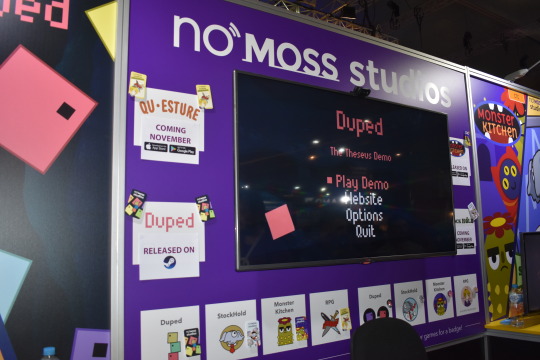
It made introductions so much easier when we arrived for set up and was so comforting knowing that it was also their first PAX and we were all in the same boat. We got to trade pins, war stories, snacks, buttons, and know we have a great friendship for next time.
We also had Loveshack and Samurai Punk directly near us, and the same thing happened over the course of the four days total. I already have plans to catch up with a bunch of them and slowly but surely will convince everyone else to move to Melbourne.
It was nice knowing we had people around us who had our back, to say hi to, to catch up with, and to occasionally sneak off to and play the games of without being too far from our booth.
Stop Touching The Build:
Seriously. Your deadline is not the day before PAX. It is not the morning of PAX. We set ourselves a deadline for the Friday before PAX. I tested it at home on the Saturday and the narration didn’t work. That was stressful enough with a full week to fix it. Just don’t do it to yourself. You will be so busy that trying to fix a build (and potentially introducing a bunch of new bugs) will be a giant nightmare. If you can, have the builddone two weeks before. Test it, over and over, in a variety of different environments, with different tech. Iron out every possible bug.

I firmly believe it was this deadline that let us not encounter any major bugs on the floor. We had to restart the build maybe twice, but otherwise, everything went super smoothly with the actual demo. We didn’t have to make people wait. Also, build in a restart system if you have a timed demo! Shift and enter reset ours to the start and worked really well to keep things moving.
Decor - Not Just A Pretty Face:
You need decor. Depending on your game, its aesthetic, its themes, the space you have - this could be super simple. You might just use your merch as decor. But regardless, you need something that says “this is our booth.”
Graphics are so important. A good clean style will say wonders about your game and your brand. Make sure you at least have something highly visible with your games logo and text that’s big enough to be seen from a distance. You’re competing with a lot of other pretty games - don’t write on a banner the day before and call it done and dusted.
Try and have an itemised list of what you need, how many, what sizes to provide to the printer as well - a lot of our stuff ended up missing/incorrectly sized. It wasn’t the biggest deal in the world, but it also wasn’t ideal and meant a lot more running around, and a lot more expenses on Ubers to get to places and back quickly.
Make sure you have a small takeaway for people to remind them of the game when they get home. Fliers get crumpled and lost - a strong business card can work wonders.

During:
Assign People Roles:
Everyone who is going to be at the booth should have some kind of role or roster. For us, this was split into a number of roles - management, press, VR, and line. Depending on your booth, you may or may not need these. We were definitely over rostered and at times we cluttered the space, so we’ll split this time even more in future. We were cautious however, and aware of how quickly we might need extra hands so I’m not surprised it went this way. It also meant we were free to take breaks and also see the occasional panel or browse the floor.

You can see an example of our roster below.

Things Will Go Wrong That Are Not In Your Control
Our neighbours rocked up and had no TV. They had a beautiful, artistic wall with a perfectly sized TV shaped hole in it. Another indie studio arrived to find that their booth literally hadn’t been built. NEVER FEAR. These things will happen, but they will get resolved, and all you can do is bounce back and get onto the convention organizers to find a solution. They got a TV. They got a booth. All will be well.
Someone will break your build. It’s inevitable, and humans are tricky creatures. Hopefully, like us, it won’t be bad - just a reset of SteamVR or your parent program and you’re back on track.
We had one of our deluxe comfort audio straps separate away from the headset slightly and didn’t have a small enough screwdriver on hand to fix it properly, so it was coming loose, making it even harder to hear what was going on with the background sound of the show floor.
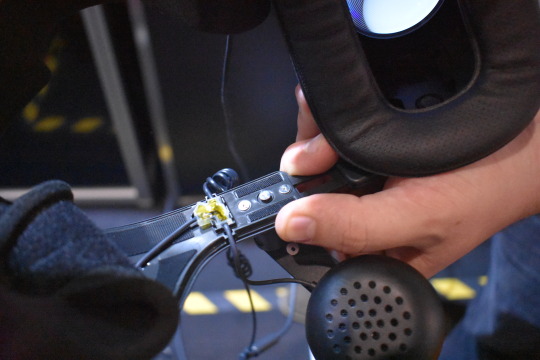
All this and more will happen. It is only a problem however, if you make it one. Don’t freak out. Pick your battles. Most things aren’t a huge deal - people are mostly kind and accepting and if you’re honest with them, you’ll be surprised how much room they’ll give you to get things back on track.
I always like to ask myself the following things whenever anything goes wrong:
Will anyone outside of our team remember this happened in an hour?
Are people even aware anything has gone wrong?
Is this worth having a serious discussion with someone about that will mean it has a solution in future?
Do I need to beat myself up for this? What will that achieve?
If the answers are no, no, no, no, nothing? You’re good. Take a breath, let it go. Get back on track as best you can, be honest with your team, be honest with your attendees.
Keep Things Clean
Horrifyingly, we found out that we were one of the few VR booths who were cleaning all their peripherals. Please don’t underestimate the potential you have as an exhibitor to get other people, as well as yourself, sick. If you’re using VR, you need to wipe down your controllers, headset, and headphones after every player. If you’re using a keyboard and mouse, try and keep them clean with a quick wipe between players where you can. It’s a nice thing to do and it helps keep the PAX pox at bay.
When you’re moving through person after person after person, you’ll find mess starts to accumulate pretty quickly - especially if you are wiping things down. We used anti-bacterial wipes and if a bin wasn’t close by and someone was in VR, it was very hard to get rid of it. It meant we ended up with little piles of wipes and paper towel, and it just wasn’t pleasant to look at. Try and have enough bins in enough strategic places - e.g. if you have wrapped bags of merch you need to unwrap, make sure a bin is nearby.
Also - keep your cupboards organised! In my and my teams madness, we ended up throwing a lot of our containers and materials into the cupboard haphazardly. Thankfully, it wasn’t too much of a problem, but don’t be like us. Be better. I BELIEVE IN YOU.
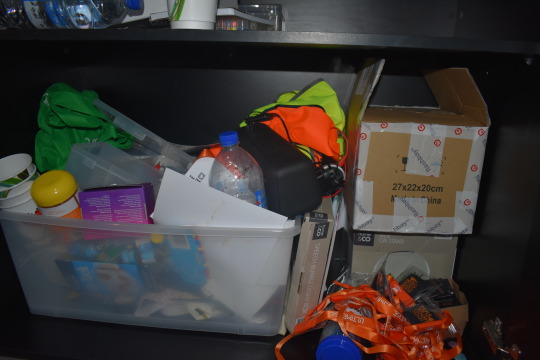
Take Care Of Yourselves - And Each Other
Make a booth kit that contains everything you might need - lozenges, mints, panadol, tissues - all the peripherals you may not have a chance to run out and get and anything you can think of. Include everything! Rubber bands! At least five different kinds of tape (you WILL use it all. I promise. You’ll think you won’t. You WILL.)

Share around Vitamin C (we used gummies because we’re adults) and Berocca and mints and everything else with your booth neighbours at the start of the day. Everyone is exhausted, give your body the best chance you can, and look after each other.

Jump at opportunities!
It is so important to capitalize on all the awesome opportunities PAX can provide, especially when you’ve invested time, energy and money. There’ll be some you’re not prepared for that will surprise you. For example, I was definitely not prepared for Channel 10 to put a camera in my face and ask me a bunch of really interesting and complex questions about VR and revenue and the Australian gaming industry. I would however, have been insane to say no. It’s amazing press for our industry, for the game, and for the studio.

If you’re uncomfortable doing these things, find someone who isn’t and get them to be a spokesperson for you. If someone wants to interview you, get someone to cover the booth for five minutes (a neighbour even!) if you don’t have someone who can cover you personally.
For another example, Vive ran a promo encouraging people to try VR games and gave us some cards and stickers the morning of. If you went to six Vive experiences at PAX, you won a prize.
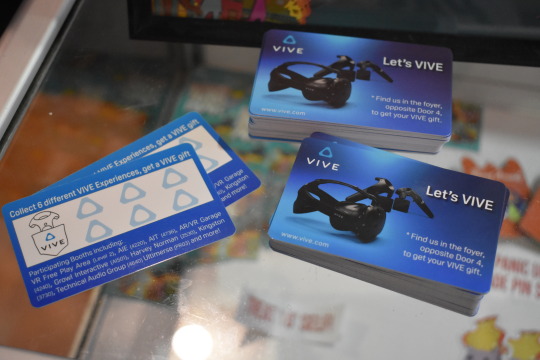
Worked for us to use them - we got to support them and they supported us in turn.
Manage The Line:
If you have one, it’s a great problem to have. Wherever possible, have someone who can reset the clock for those people waiting by having a quick chat to them about their day.
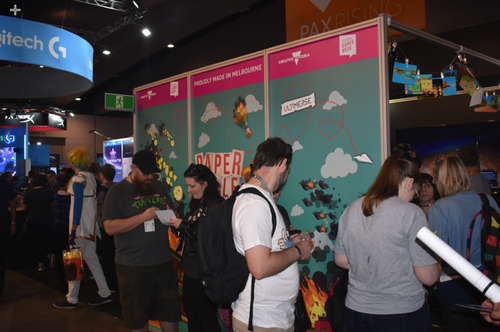
Psychologically, by saying “thanks for waiting” rather than sorry for the delay, you not only reset the amount of time a person feels like they’ve been waiting, but they feel appreciated and respected rather than inconvenienced.
Language has a huge impact, so don’t be careless with it. The people in your line could be anywhere, seeing anything, and they chose here - so be kind and inclusive and give them the time of day.
Run A Competition:
People are by nature, pretty competitive. If your game has a competitive element you’re already in a great position. Keep a leaderboard! This will encourage people to return to your booth even if they’ve already seen it and potentially bring friends. We should have invested in a timer to keep a “best time” score as well as our normal timer for tracking demo length, as we were surprised how much people wanted to beat their friends time.
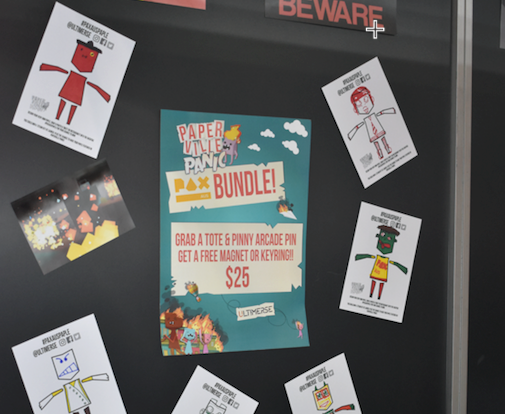
We ran a colouring competition which initially was slow to take off, but ended up being a lot of fun. Not only was it super invigorating seeing everyone's outside of the box ideas, but we now get to give someone an awesome prize and put the character they designed into the game. That’s just as cool for us as it is for them.
Don’t Write People Off!
Gamers and game developers have a tendency to be a little judgemental, and a little snobby about what games people might like. Just because someone is at the expo with their kids, or is over a certain age, or whatever other superficial factor we might notice, doesn’t mean they wouldn’t personally enjoy being included. Parents especially get a crappy deal a lot of the time with these events, so be inclusive! Ask them if they want to try!
My favourite part of the whole three days was a friend of ours from @BondiLabs who had playtested for us in the past bringing by his Mum to the booth. She had never played a VR game before, but not only that… she’d never played a GAME before. We managed to convince her to give it a shot and she loved it and was so stoked that she’d tried, and that feeling for me is the entire reason I’m in this industry. Give people a chance to love your game - you might just get some feedback that changes your world!

Enjoy It
You’ve worked so hard to get here. Don’t let it pass you by.
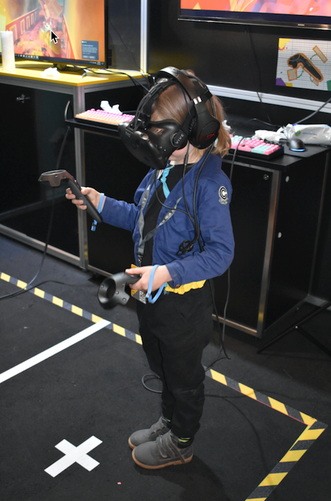
Take a moment, take a breath, and watch someone love the game you put your heart and soul into. It’s so so worth it.
AFTER:
Follow Up Leads:
You probably made a LOT of friends during PAX. Don’t let all those great conversations go to waste. Follow up your leads! I used a Trello board to take photos of all the business cards I’d collected (you will inevitably lose them, if you’re anything like me!) and tag people as press, influencer, industry, fellow game dev - you get the idea.
This let me jot down a few notes about what we’d talked about, know who to follow up and mark them so, and keep track of who I’d contacted and when. I can continue to add to this over time until eventually, I’ll have an entire digital record of the people I know and connections I have. These people will help you grow - they might be mentors, friends, support systems, potential future colleagues. Keep in touch!
Compile Feedback:
During your time at your event you’ll receive a lot of feedback from players and industry. Make sure you write down everything you recall so you can compile it and provide it to anyone who was unable to attend. This is the biggest opportunity for playtesting you’ll have other than more expos, and you’re testing a hugely wide subset of the market. Make a list, a spreadsheet - whatever works for your team and work on the bugs, ideas, and issues you noticed or encountered.
Check Goals:
Go back to your own goals and assess them. Go through them individually, then as a team, and present everything to make sure the event was worthwhile. The last thing you want is to spend the amount you did and not assess how you actually went, otherwise what was the point?
Thank People!
You might have met people who you may have no professional need to follow up - but it doesn’t matter. These events don’t just happen overnight. Thank your team, thank your volunteers, thank the organisers, thank the press. Anyone and everyone who was involved invested time, energy and effort. Value that and recognise that.
What Worked/What Didn’t:
This sort of comes under goals. Make note of the things that went wrong, the money that was spent unnecessarily - all these things will help when you do this again but you need to write it down so you don't forget come next exhibition.
Expenses:
Below is an approximate breakdown of just how much we spent on PAX, rounded out. We made a conscious decision to invest a large amount of money in this specific PAX to make as big an initial impact as we could. The spending will be inevitably very different for our next event, depending on a number of different impacts. We think it’s important to be transparent about just how much this can cost a studio, but depending on what’s available to you, you could cut a number of corners through the above steps and reduce your costs (booth size, graphics, merch).
AMOUNTS
Wages $5500~
Booth
Booth Hire $1000~
Signage + Furniture (inc infills) $2000~
TV Hires (TV’s x 2) $1000~
PAX Tickets (Team + Investors) $1000~
Marketing Campaign $200~
Merchandise
Pins $6000~
T-Shirts $800~
Magnets $300~
Playtesting Pins $750~
Tote Bags $1200~
USBs $800~
Match Boxes $250~
Key Rings $400~
Business Cards $800~
Banner $80~
Posters $300~
Equipment $500~
Food $150~
Health Kit $200~
Total:
$23,230~
Best of luck, and please by all means get in touch with me if you have any other questions! You don't have to do a booth like us - make it yours, with whatever resources you have - the indie community will always be here to support you.
Below you can see a cute little video we made of our booth and the event.
Here are some other handy links.
Useful Links:
Blank Booth Bible Template:
Customize your own booth bible to your studio and use it as a platform to organise yourself!
https://docs.google.com/document/d/1DI4fP6Y3m5K-0C_uA09qFFZswWtYViabQ-e9S6cbitc/edit?usp=sharing
Indie Booth Creation Website:
An awesome resource to help you create checklists, assess what you need, and costs. https://indieboothcraft.com/
You Suck At Showcasing Your Game:
A great talk about how to and how not to show your game at events. https://www.youtube.com/watch?v=gB8CvsOjDvg
Indie Game PR: 5 Years of Painful Lessons
Another great talk that touches on expos andtheir impact + getting the most out of them
https://www.youtube.com/watch?v=nBH_X3hMvn4
Read more about:
Featured BlogsYou May Also Like